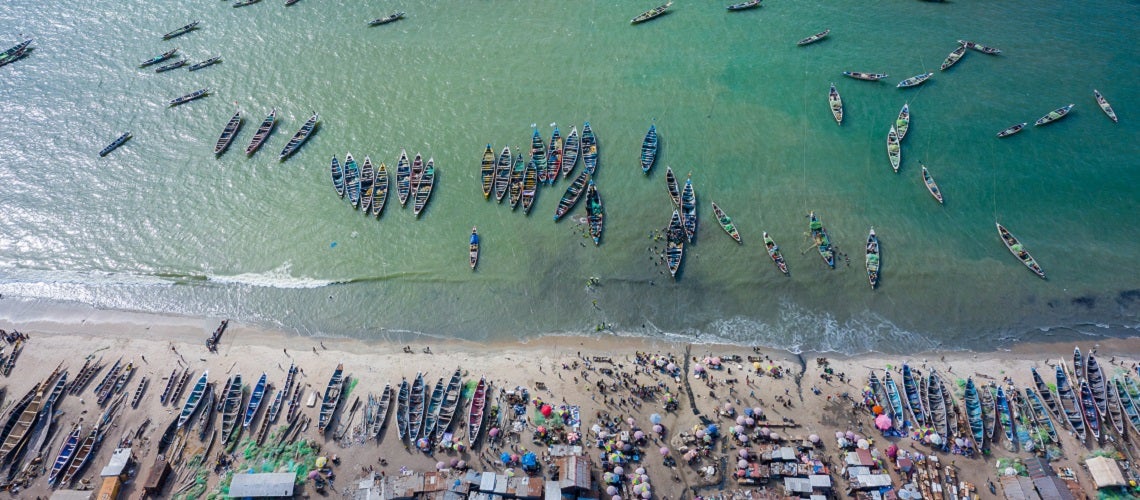 Aerial view of unloading of fishing boats in the fishing village of Tanji, The Gambia, West Africa.
Aerial view of unloading of fishing boats in the fishing village of Tanji, The Gambia, West Africa.
On March 4, 2023, United Nations (UN) delegates in New York concluded negotiations on a new treaty for the conservation and sustainable use of marine biological diversity of the areas beyond national jurisdiction, called the BBNJ agreement. This milestone was reached after years of negotiations and long days of discussions. Once formally adopted, the BBNJ agreement will aim to address a wide range of marine challenges, recognizing biodiversity losses and ecosystem degradation from climate change impacts, pollution, and harmful changes to the marine environment. To achieve this, the BBNJ agreement sets a framework for accessing marine genetic resources including questions on benefit-sharing, conducting environmental impact assessments on planned activities, and establishing area-based management tools including marine protected areas. The next steps involve the formal adoption of the treaty text by the UN member states and ratification of the treaty by at least 60 countries to enter into force.
The BBNJ agreement is a significant step in promoting effective ocean governance, conserving marine biodiversity, and ensuring the sustainable use of marine resources. Additionally, mechanisms for capacity-building and technology transfer from developed to developing countries are also included in the agreement.
"The BBNJ agreement is a significant step in promoting effective ocean governance, conserving marine biodiversity, and ensuring the sustainable use of marine resources."
Free training available through the Ocean Governance Capacity Building Program
To provide further information and training on the BBNJ agreement and other international agreements related to the oceans and the blue economy, the Ocean Governance Capacity Building Program has been initiated by the World Bank’s Legal Department and its Environment, Natural Resources and Blue Economy Global Practice, in partnership with the University of Melbourne Law School, the Division for Ocean Affairs and the Law of the Sea of the Office of Legal Affairs of the United Nations, the International Seabed Authority, the Food and Agriculture Organization of the United Nations, and the Center for Maritime and Oceanic Law at the University of Nantes. The program is financed by the World Bank’s multi-donor trust fund Blue Economy Program - PROBLUE – and includes regional workshops on key international legal frameworks on ocean governance, including topics such as biodiversity, blue economy, and climate change. The next Ocean Governance Capacity Building course is for participants from the Indian Ocean Region and is scheduled starting the week of September 11, 2023, in both French and English. The course is free and open to government officials, staff of partner institutions, and representatives from civil society and the private sector who are working directly on ocean governance issues. Applications for the Indian Ocean Region French and English courses close on May 16, 2023, at 1.59 pm UTC-5. For more information, please see here or email oceangovernancetraining@worldbank.org.



Join the Conversation